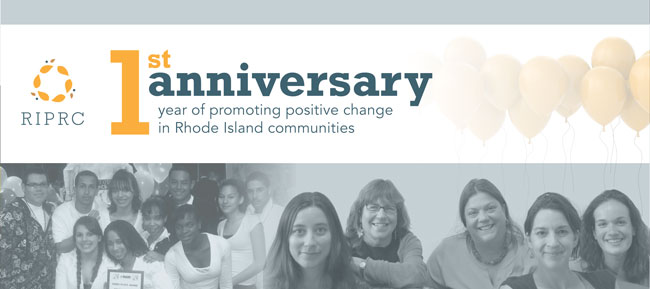The Rhode Island Prevention Resource Center (RIPRC)
Shannon Spurlock, Center Director
Prevention Focus: Training, Technical Assistance and Capacity Building
In this interview, Shannon Spurlock reflects on the accomplishments of the RIPRC in its first year and shares the Center’s vision for the coming years.
This month marks the first anniversary of the Rhode Island Prevention Resource Center. Congratulations!
Thank you! I’m very excited about the variety of initiatives that the Resource Center has been able to implement in just one year. One of the keys to the success of the RIPRC is our team. We have an amazing staff with an incredible range of skills. Sometimes I am the only one who is seen, but the RIPRC could not have been built without every member of our team working toward a common vision. The team currently works to keep the RIPRC running behind the scenes.

Why was the RIPRC created and where did the vision for it come from?
The vision for the RIPRC came from our funder, the Department of Behavioral Healthcare, Developmental Disabilities and Hospitals (BHDDH). Thinking of the future of the state, BHDDH wanted to invest in developing a prevention infrastructure to provide training and technical assistance and capacity-building services to existing prevention providers.
One of the Resource Center’s primary goals is to support substance abuse prevention providers, other prevention providers, and community partners in order to create a larger, more effective prevention network in RI. How does the Resource Center work with these different groups to foster relationships, and why is it so important that these groups collaborate?
We work with local community prevention providers on a regular basis. It is a collaborative process. From the beginning, it was very important that we got a sense of what our prevention providers wanted and needed for training and technical assistance. The RIPRC conducted a provider needs assessment as one of our first initiatives, and RIPRC’s scope of work was defined by the needs assessment results.
So far, we have worked with a wide variety of community coalitions to provide tailored technical assistance services. Earlier this year, for example, we developed and offered a proposal development training focusing on sustainability, in direct response to the results of the needs assessment, to more than 20 providers.
We have also worked with the RI Prevention Certification Board and the providers to ensure that the training and technical assistance that we provide increases the number and network of certified prevention providers.
Using our limited resources wisely is of utmost importance, and one of our modus operandis at the RIPRC is to not recreating the wheel. We connect providers to existing online and in-person state-, region-, and nation-wide training opportunities. We also provide technical assistance to BHDDH. We helped draft an update for the Rhode Island Strategic Plan for Prevention, and made recommendations to incorporate a standing Prevention Advisory Group as part of the Governor’s Council on Behavioral Health. Lastly, we created a Training and Technical Assistance Plan based on the needs assessment, and are in the process of incorporating the strategic and training and technical assistance plans to draft a Workforce Development Plan for prevention providers in the state.
All this “planning” creates a more consistent and competent prevention workforce, which allows us to use our limited resources efficiently and effectively.
One of RIPRC’s greatest achievements so far has been the RIPRC.org website. What makes RIPRC.org useful to Rhode Island?
I’m extremely proud of the website. It is part of our broader communications plan, which includes regular e-news updates and highlights the other training and technical assistance and capacity-building services that are provided by the Resource Center. What I really like about it is its focus on local providers. We highlight what local providers are doing, local trainings and events provided by prevention partners, and have a calendar with prevention-specific opportunities.We strive to keep this a live, active website with new information and up-to-the-moment resources added on a regular basis.
We also encourage input from our prevention providers and partners to ensure that the website has the information that they need to facilitate their work and resources to share within their communities. Our aim is to make the website a comprehensive place to store information, resources, research, and events with the help and input of the prevention community.
Prevention is an evidence-based science and research must be accessible for prevention providers and the communities they serve. We have developed basic printer-friendly fact sheets on topics that prevention providers requested.
We are constantly updating and improving the functionality and content of RIPRC.org to make it more useful for our partners in prevention. Again, I have a great team working on RIPRC.org; they make me look good!
What’s next for the RIPRC?
I am so glad you asked! In addition to continuing to provider training and technical assistance to additional communities, we are developing a password-protected platform on RIPRC.org that will allow prevention partners to collaborate and share information. We are hoping to create an active e-forum to enable providers to collaborate on more effective solutions to prevention challenges.
We are also really excited about our next e-news. It will have our first video community profile, starring Youth Pride, Inc., an LGBTQ resource for young people in RI. We hope that featuring YPI will highlight the importance of bringing a holistic and collaborative approach to the prevention field.
Shannon, you have worked many years in the prevention field. What do you think makes the RIPRC such a special resource for Rhode Island?
I have been in the prevention and health education field for more than 20 years. Wow!
One of the things that makes the RIPRC so exciting to me is that we provide “one-stop shopping” for providers wherever they are. We have prevention providers who have 10 years of experience in the field and need advanced services, and we have people who are new to the field and need a solid basic foundation. We understand that all of our providers may need support, but what that support is comprised of will vary considerably. The point is that we are equipped to serve everybody.
We are also unique because we have key behavioral health networking opportunities. For example, we participate on the State Epidemiological Working Group, are non-voting members of RI Prevention Certification Board, participate in the Governor’s Council for Behavioral Health, and are a member of the HIV Prevention Coalition. Our goal is to integrate prevention into as many behavioral health forums as possible. Rhode Island has limited prevention funding, so it’s more important than ever to build synergy across multiple systems to support prevention.




